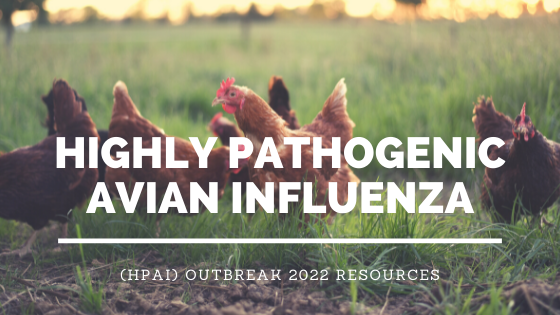HPAI Guidance for Poultry Shows, Swaps, and Commingling Events
(Current Situation – Updated February 09, 2023)
Highly pathogenic avian influenza (HPAI) virus was detected in the United States in the wild bird population in January 2022 and in the domestic poultry population in early February of 2022. It has since been confirmed in 755 flocks across 47 states impacting more than 58.3 million domestic birds nationwide. HPAI is a highly contagious and fatal foreign animal disease in domestic poultry (such as chickens, turkeys, pheasants, quail, and guinea fowl). Wild waterfowl and shorebirds serve as a reservoir for influenza viruses and can spread the virus to domestic poultry. There is no vaccination or treatment for this disease; the only control method is depopulation of affected flocks. Some strains of HPAI can also be zoonotic (transmitted to people).
Since spring of 2022, HPAI has been confirmed in 21 domestic poultry flocks in Colorado impacting more than 6.2 million poultry across the state. Disease detection has been confirmed in both wild and domestic birds in 34 counties across Colorado. Updates on detections in Colorado can be found at: ag.colorado.gov/HPAI
As this outbreak is ongoing and dynamic, the current guidance may be subject to change.
What Flock Owners Can Do
Increase Biosecurity: At this time, we are asking all poultry owners to increase biosecurity measures to keep their birds healthy. The most important biosecurity practices that flock owners can take include limiting exposure of their birds to wild birds and other poultry flocks and limiting introduction of new birds into their flocks. The USDA Defend the Flock website has helpful resources for keeping poultry healthy in any operation.
Monitor For Illness: Monitor your flock for clinical signs of HPAI, including production parameters (decreased feed and water consumption, egg production) and increased mortality. Know the warning signs of infectious bird diseases. Contact your veterinarian if illness is noticed in your flock.
Report Sick Birds: Don’t wait. Report suspicious disease events in domestic poultry to the State Veterinarian’s Office at
(303) 869-9130 or the CSU Avian Health line (970) 297-4008.
Poultry Event Guidance
Commingling of birds presents a risk for disease introduction and transmission of this highly fatal disease. The decision to postpone or cancel poultry shows, sales, swaps and events is up to the local event organizers, except in the case of quarantine, health order, or movement restriction – whether all-state or site-specific. If shows and events take place, the State Veterinarian’s office strongly recommends that event organizers implement extra precautionary measures to minimize the risk of transmission of HPAI.
Prior To Event: Flock owners should monitor the health status of their flocks prior to the event. Any flock showing signs of illness or mortality should not be permitted to enter the event. As a reminder, all poultry entering Colorado from out-of-state must meet the poultry import requirements.
During Event: Event organizers should develop site and event specific biosecurity and monitoring plans. If birds become ill during the event, those birds should be isolated and reported to the State Veterinarian’s Office. The CFSPH toolkit “Bring Home the Blue, not the Flu” is a helpful resource for event participants on implementing biosecurity and limiting disease spread during events.
Post Event: Flock owners should isolate their birds for 14 days and monitor for signs of illness. This can help prevent introduction of disease to the rest of the birds at home. Equipment and cages used at the event should be thoroughly cleaned and disinfected prior to use at home.

On May 18, 2022, HPAI was detected in a backyard flock in Jefferson County. All poultry owners are recommended to heighten biosecurity practices and to follow reporting procedures as outlined below.
CDA’s Emergency Rule Temporarily Suspends All Colorado Poultry Events
Please refer to the Colorado Dept. of Ag website for recent Colorado developments and webinars. Highly Pathogenic Avian Influenza Webinar for Backyard and Exhibition Poultry Producers
What is Highly Pathogenic Avian Influenza (HPAI)?
Avian influenza (AI) is a viral disease that can infect most domestic poultry (chickens, turkey, geese, ducks, pheasants, and guinea fowl) and wild waterfowl. AI occurs naturally in waterfowl and shorebirds without causing noticeable illness. Different strains of AI can be classified by their pathogenicity as either low pathogenicity or high pathogenicity. HPAI strains are extremely dangerous to domestic commercial and backyard flocks, causing sudden death, and rapidly spreading from flock to flock. HPAI is very infectious and lethal. There is no treatment or vaccination for HPAI.
Where has HPAI Been Found?
As of April 22, 2022, HPAI has been detected in the Denver Metro. See the most up to date information here.
For more information on where HPAI has been detected in 2022 refer to the APHIS website.
Symptoms of HPAI
Birds infected with HPAI may show one or more of the following signs:
- Sudden death without clinical signs
- Lack of energy or appetite
- Decreased egg production or soft-shelled or misshapen eggs
- Swelling of head, comb, eyelids, wattles, and hocks
- Purple discoloration of wattles, combs, and legs
- Nasal discharge, coughing, and sneezing
- Incoordination
- Diarrhea
From USDA-APHIS Defend the Flock
How the disease in transmitted?
- Foot traffic
- Secretions from the bird
- Contact with infected droppings
- Movement of sick birds
- Contaminated clothing and equipment
Poultry with HPAI do not survive the illness. Vaccines for HPAI are not readily available.
What to do to Prevent HPAI in your Backyard Flock
Now is the perfect time to review your biosecurity plan. Basics steps to keep your birds safe include:
- Keep domestic poultry and fowl away from interacting with wild waterfowl; keep birds under cover and away from areas where migratory, wild waterfowl congregate
- Keep visitors to a minimum
- Wash your hands before and after coming in contact with live poultry
- Change clothes before entering poultry area and before leaving the property
- Clean and disinfect tools
- Don’t kiss your chickens
- Know the signs of illness
- Report sick birds

Where to Report Sick or Dying Birds in Colorado
If your birds are sick or dying, report it right away. This is one of the most important things you can do to keep HPAI from spreading.
CALL:
1. Your flock or local veterinarian
2. The State veterinarian (303) 869-9130, available 24 hours/day
3. The State avian health team (970) 297-1281, only answered 9-5weekdays
4. USDA Sick bird line, toll-free at 1-866-536-7593.





